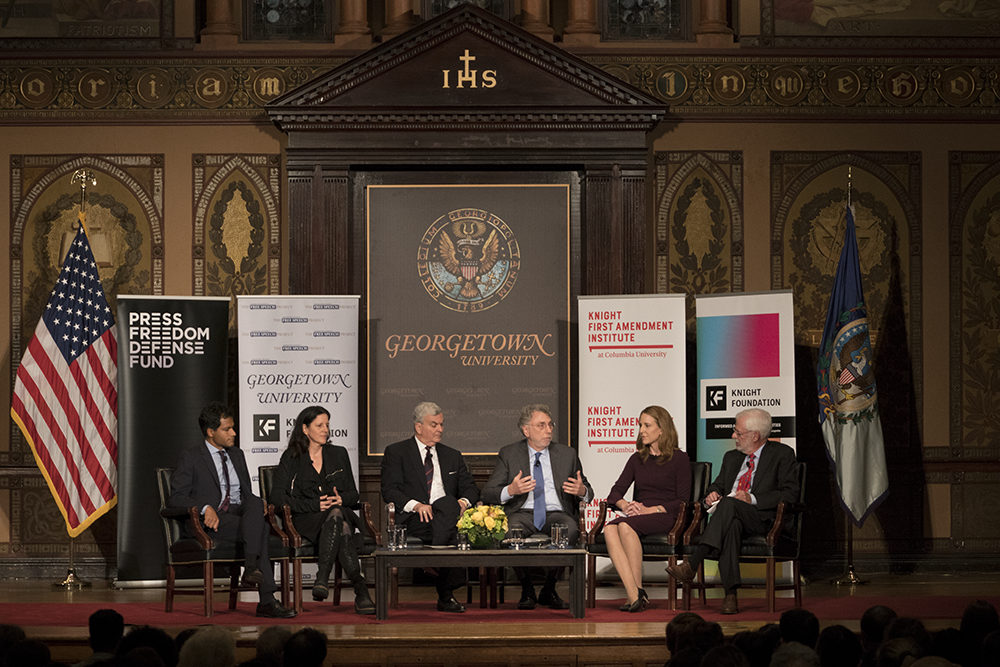
Left to right: Jameel Jaffer, director of the Knight Institute; Laura Poitras, a documentary filmmaker who reported on the National Security Agency’s PRISM surveillance program after receiving classified information from Edward Snowden; Alberto Mora, former general counsel of the U.S. Navy known for leaking information about torture at Guantanamo Bay; Martin Baron, executive editor of The Washington Post; Carrie Cordero, former counsel to the assistant U.S. attorney general; and Sanford Ungar, the director of Georgetown’s Free Speech Project.
At a time when the press’s relationship with the executive branch is increasingly strained, protecting the First Amendment rights of both journalists and whistleblowers —those who leak information about a person or organization engaged in illegal activity —is increasingly important, panelists said at a forum in Gaston Hall on Monday night.
Hel in partnership between Georgetown University’s Free Speech Project and the Knight First Amendment Institute at Columbia University, “Secrets and Leaks: Whistleblowers, Journalists, and National Security,”focused on the intersection of investigative journalism and national security.
Speakers included Martin Baron, executive editor of The Washington Post; Carrie Cordero, former counsel to the assistant U.S. attorney general; Jameel Jaffer, director of the Knight Institute; Alberto Mora, former general counsel of the U.S. Navy known for leaking information about torture at Guantanamo Bay; and Laura Poitras, a documentary filmmaker who reported on the National Security Agency’s PRISM surveillance program after receiving classified information from Edward Snowden.Sanford Ungar, the director of Georgetown’s Free Speech Project, moderated the event, which was co-sponsored by The Hoya and Lecture Fund.
Panelists analyzed the current relationship between media and the government, addressing President Donald Trump’s rhetoric about the press and its impact on potential leakers.
“People are afraid,” Baron said of potential government sources. “They’re afraid they’ll be prosecuted; they’re afraid of being blackballed, that they’ll be shifted into a lower-level position or into some obscure corner office.”
Jaffer said the White House’s public attitude toward the media affects not only government sources but also journalists.
“I think that the statements that the White House is putting out there have an inevitable, and I think quite deliberate, chilling effect on would-be leakers and probably on journalists too,” Jaffer said. “I think they’re a lot more careful about decisions with sources than they might have been 10 years ago.”
The panel used the cases of Snowden and panelist Mora, among others, as examples of whistleblowing, noting that while rhetoric toward journalists who publish leaked information has become more hostile, protections for those who release classified information related to national security have historically lacked protection under the First Amendment.
Looking at more recent cases, including a New York Times op-edpublished Sept.. 5 written by an anonymous source in the White House, Baron argued that the Trump administration has inaccurately characterized leaks as threats to national security.
“What’s at risk is reputations, with the politicians involved, the president involved, and his administration, and they fear risk of embarrassment,” Baron said.
The panelists debated benefits and drawbacks of government leakers and the dangers they face when disclosing confidential information to the press. Ungar pointed out an apparent contradiction in the protections afforded journalists but not whistleblowers.
“This is an odd system we seem to have around here, where reporters have protection but often people who give them information do not have protection,” Ungar said.
Jaffer indicated that whistleblowers should be given the same protections as journalists when releasing the information is beneficial to the public.
“Why should we deny whistleblowers the protections we give to the press in those instances in which the disclosures are in the public interest?” Jaffer said.
Those who release classified information on national security, like Snowden, have little protection under the First Amendment. However, Poitras and Mora argued that leakers make this sacrifice to fulfill their civic duty.
“It’s the burden of the press and the public to demand the government tell us what it’s doing,” Poitras said.
Baron said First Amendment protections should extend to leakers of classified information, referencing the intentions of the founders who initially articulated these free speech protections.
“The public is supposed to be a check on government, and the reason we have this amendment is not just a guarantee of a free press, but of free expression for all,” Baron said.




















